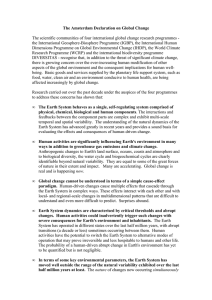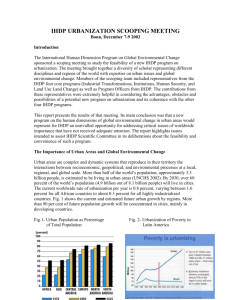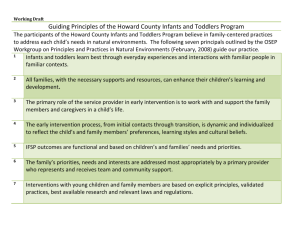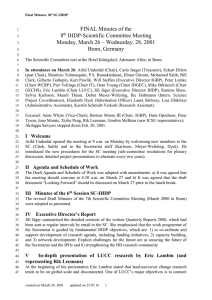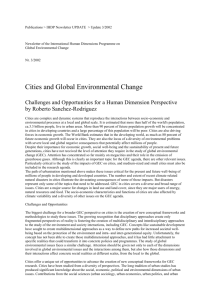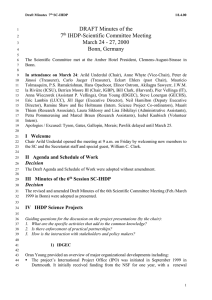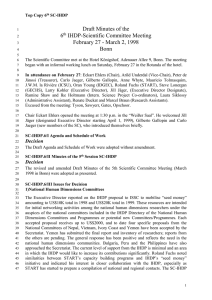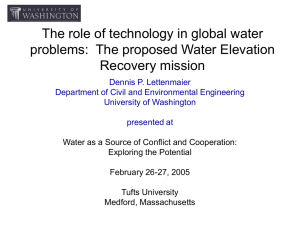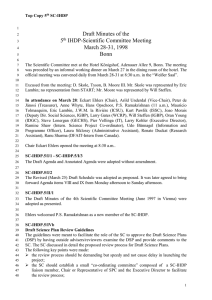Minutes of the 4 IHDP-Scientific Committee Meeting June 9-11, 1997
advertisement
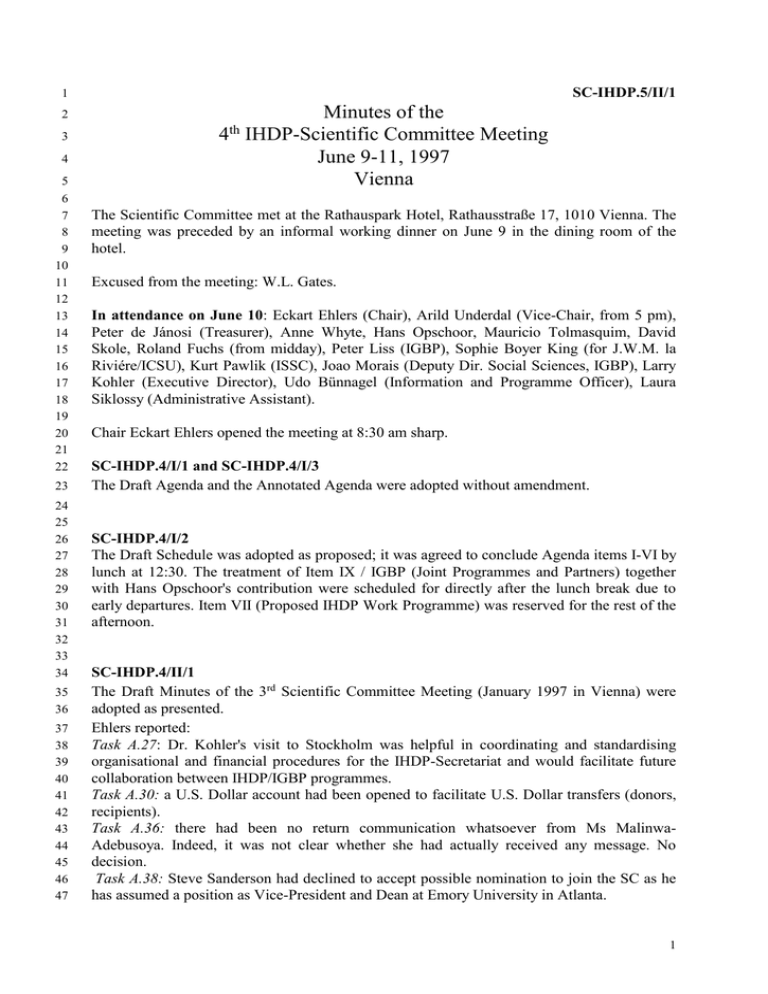
SC-IHDP.5/II/1 1 2 3 4 5 6 7 8 9 10 11 12 13 14 15 16 17 18 19 20 21 22 23 24 25 26 27 28 29 30 31 32 33 34 35 36 37 38 39 40 41 42 43 44 45 46 47 Minutes of the 4 IHDP-Scientific Committee Meeting June 9-11, 1997 Vienna th The Scientific Committee met at the Rathauspark Hotel, Rathausstraße 17, 1010 Vienna. The meeting was preceded by an informal working dinner on June 9 in the dining room of the hotel. Excused from the meeting: W.L. Gates. In attendance on June 10: Eckart Ehlers (Chair), Arild Underdal (Vice-Chair, from 5 pm), Peter de Jánosi (Treasurer), Anne Whyte, Hans Opschoor, Mauricio Tolmasquim, David Skole, Roland Fuchs (from midday), Peter Liss (IGBP), Sophie Boyer King (for J.W.M. la Riviére/ICSU), Kurt Pawlik (ISSC), Joao Morais (Deputy Dir. Social Sciences, IGBP), Larry Kohler (Executive Director), Udo Bünnagel (Information and Programme Officer), Laura Siklossy (Administrative Assistant). Chair Eckart Ehlers opened the meeting at 8:30 am sharp. SC-IHDP.4/I/1 and SC-IHDP.4/I/3 The Draft Agenda and the Annotated Agenda were adopted without amendment. SC-IHDP.4/I/2 The Draft Schedule was adopted as proposed; it was agreed to conclude Agenda items I-VI by lunch at 12:30. The treatment of Item IX / IGBP (Joint Programmes and Partners) together with Hans Opschoor's contribution were scheduled for directly after the lunch break due to early departures. Item VII (Proposed IHDP Work Programme) was reserved for the rest of the afternoon. SC-IHDP.4/II/1 The Draft Minutes of the 3rd Scientific Committee Meeting (January 1997 in Vienna) were adopted as presented. Ehlers reported: Task A.27: Dr. Kohler's visit to Stockholm was helpful in coordinating and standardising organisational and financial procedures for the IHDP-Secretariat and would facilitate future collaboration between IHDP/IGBP programmes. Task A.30: a U.S. Dollar account had been opened to facilitate U.S. Dollar transfers (donors, recipients). Task A.36: there had been no return communication whatsoever from Ms MalinwaAdebusoya. Indeed, it was not clear whether she had actually received any message. No decision. Task A.38: Steve Sanderson had declined to accept possible nomination to join the SC as he has assumed a position as Vice-President and Dean at Emory University in Atlanta. 1 48 49 50 51 52 53 54 55 56 57 58 59 60 61 62 63 64 65 66 67 68 69 70 71 72 73 74 75 76 77 78 79 Task A.31, 32: Three proposals were submitted under Chair Ehler's name to ENRICH: All three were accepted and were expected to be funded. The U.S. NSF had decided not to cofund the Institutions proposal. Task A.34: The per diem regulations for travel are being negotiated with the funding institution (the German Government Ministry for Education, Research and Technology). The IHDP-Secretariat strongly urged the SC to consider the adoption of appropriate international per diem scales such as the ICSU scale in order to reinforce the IHDP’s international and independent status. 80 ACTION 1 81 82 83 84 85 86 87 88 89 90 91 92 93 94 95 96 97 The Draft Constitution (Annex 2) was adopted as amended. The final text will be circulated by email by September 15, 1997. It will also be submitted to ICSU/ISSC for approval. IHDP activities/events/representation Chair Ehlers presented six items: a) Dr. Larry R. Kohler officially assumed his position as Executive Director of the IHDP-Secretariat on March 1, 1997. He offered his congratulations and appreciation for Dr. Kohler's efforts in reconstituting the IHDP-Secretariat. b) Laura Siklossy was introduced as the new Administrative Assistant in the IHDP-Secretariat (from April 1, 1997). c) Udo Bünnagel was introduced in his capacity as Information and Programme Officer in the IHDP-Secretariat. d) The first edition of the IHDP UPDATE newsletter was presented. It represents the first visible and well received achievement of the newly constituted IHDPSecretariat. e) The decision of Susanne Klunkert to terminate her contract with the IHDPSecretariat was announced officially. She had taken on a challenging position in Brussels. Her replacement was currently being sought from among more than fifty international applications. The candidate was expected to begin work in September 1997. f) The IHDP-Secretariat will tentatively move into new office premises in Bonn at the end of 1997. SC-IHDP.4/IV/1 (Annexes 1, 2) The finalized Constitution will then be submitted to ICSU and ISSC for approval on the occasion of their Board Meeting on October 1, 1997. The SC-members agreed to incorporate Option A /Conflict of Interest (page 1, SCIHDP.4/IV/1) and Option C(i) / Liability (page 2, SC-IHDP.4/IV/I) into the redrafted Constitution. SC-IHDP.4/IV/1 Annex 3 was adopted with one correction (the terms "annual" and "annually" will be deleted) as an integral part of the Guiding Principles (which is still to be drafted) governing the Conflict of Interest. SC-IHDP.4/IV/2 National Committees 2 98 99 100 101 102 103 The IHDP-Secretariat has currently approx. 15 direct national contacts. The identification and mobilisation of National Committees will be one priority duty for the new International Scientific Project Co-ordinator (Ms Klunkert's replacement in the IHDP-Secretariat). Efforts to develop contacts in Latin America must be strengthened and the IAI may be a key source of support. The active support by the SC in supplying names of contacts was requested. 104 ACTION 2 105 106 The IHDP-Secretariat was requested to prepare a Directory, to be regularly updated, on national HD committees and programmes. Projected completion Fall 1997. 107 108 109 110 111 112 113 114 115 SC-IHDP.4/IV/3 UN Links It was agreed that the IHDP should adopt a positive and collaborative approach and purpose regarding the pursuit of potential priority links with UN organisations. Due to budget and personnel restrictions, the IHDP-Secretariat should seek to be visible on a selective, limited scale. Priority should be given to developing its capacity to provide services to the UN system, for example, by providing a compilation of experts, addresses, state of the art reports etc. 116 ACTION 3 117 118 The Executive Director was requested to continue to closely monitor IHDP links with the UN system and other relevant international organisations and institutions. 119 120 121 122 123 124 125 126 127 128 129 130 131 132 133 134 SC-IHDP.4/IV/4 IHDP Information Activities Udo Bünnagel presented the seven main elements of the IHDP information strategy: a) UPDATE: This is a complimentary quarterly newsletter. The first edition was distributed to ca 4000 addresses (“old” addresses provided from HDP sources, etc) with a projected future circulation of ca 1000. Additional informative sections will be added as needed/requested, and a comprehensive evaluation is foreseen for 1998. Contributions are requested, the deadlines for which will be announced. b) Web Page Calendar of events updated twice weekly c) Briefing Notes: update for research community appearing as required d) Leaflet General Information e) E-mail Circulars f) Scientific Publications (Science Plans) g) Press Releases 135 ACTION 4 136 137 As no briefing note had yet been prepared for LUCC, the SC-IHDP requested the Secretariat to prepare one as soon as possible. 138 139 140 141 142 143 144 145 SC-IHDP.4/IV/5 Links with Research Projects and Joint Activities The need for common, harmonized terms of reference and consistent vocabulary within the IHDP was stressed in order to ensure clarity and transparency both internally and externally. The discussion provided much appreciated guidance for the IHDP-Secretariat in delineating procedures. 3 146 147 SC-IHDP.4/IV/5 Annex 1 Diagram IHDP Structure 148 ACTION 5 149 150 The IHDP-Secretariat will circulate by e-mail for final approval a revised Structure Diagram incorporating the comments and constructive criticisms advanced by the SC-Members. 151 152 153 154 155 156 157 158 159 160 161 162 SC-IHDP.4/IV/5 Annex 2 IHDP Project Cycle Basic guidelines regarding Scoping Reports were discussed: Scoping Reports constitute a commitment. In future, a more focussed (policy oriented, problem oriented) approach and a higher standard must be achieved, in order to ensure credibility. Currently there are no criteria for judging the quality and content of scoping reports. The general consensus proposed that they be subjected, as a minimum criterion, to a peer review. The already completed Scoping Reports should not be officially published but circulated "internally" (committee documents or white papers) as a service to the science community towards developing and formulating science plans. 163 ACTION 6 164 165 The Project Cycle was endorsed in principle by the SC. The IHDP-Secretariat will circulate by e-mail an amended Project Cycle for final approval. 166 167 168 169 170 171 172 173 174 SC-IHDP.4/V/1 Budget and Cash Flow The financial status of the IHDP is "happy" but not entirely satisfactory. The financial overview is relatively complicated due to bureaucratic constraints in Bonn; the hiring of a part-time accountant is a priority for the IHDP-Secretariat. The Auditing Report June-Dec. 1996 from Ellen Wiegandt had not yet been submitted. Nevertheless, the general recommendation was to try to close the "HDP chapter" as soon as possible. 175 ACTION 7 176 A Financial Report for the first half of 1997 from Dr. Kohler will need to be prepared. 177 178 179 180 181 182 183 184 185 186 187 188 189 There was general impatience and lack of understanding expressed among the SC-Members at the limited follow up action by IGFA vis-à-vis promised funding support for IHDP. The IGFA resource assessment will not be required from the IHDP because it is such a "young" organisation. Nevertheless, IHDP will be requested to prepare a “Resource Requirement Survey” for the next IGFA meeting in October 1997 in Tucson, AZ. Funding by ENRICH and COSSA and potentially NSF were welcomed as positive signs of support. As equal funding partners, ISSC and ICSU are obligated to donate fully equal amounts to the IHDP-Secretariat, and some concern was expressed regarding ISSC fully meeting its commitment in 1997. 190 ACTION 8 191 192 The Secretariat was requested to estimate the potential additional costs of convening a SAC meeting in 1999 and to include it in future IHDP budget estimates. 193 4 194 195 196 197 198 199 200 201 202 SC-IHDP.4/V/2 Annexes 1 and 2 Financial Procedures, Reimbursement The documents have been drafted on the basis of ICSU guidelines. A fact-finding mission to the IGBP Office in Stockholm (April 1997) aided the Executive Director in drawing up a set of procedures. The members of the SC unanimously approved adoption of the ICSU rules regarding the reimbursement of travel, i.e. per diem rates. They also endorsed in general the proposed Financial Procedures and urged the Executive Director to implement them in a fair and flexible manner. 203 204 205 206 207 208 SC-IHDP.4/V/3 Membership Contribution The UN scale of membership payments represents only one example of a possible international scale of contributions. The IGBP membership system approximately parallels the UN scale. 209 ACTION 9 210 211 212 213 The SC recommended the following action: the IHDP-Secretariat should write to the National Committees indicating that others are contributing and ask for a donation, giving a payment guideline. This should be done on a one-to-one basis and indicate that the request is independent of a contribution scheme which is still to be established. 214 215 216 A formal Contribution Scheme entailing membership contributions must be delineated by 1999, when the German core grant may be expected to terminate or be significantly reduced. 217 ACTION 10 218 The SC-Members were urged to submit names and addresses of potential donor contacts. 219 220 ACTION 11 221 222 The Secretariat was requested to prepare a revised proposal concerning membership contributions for the next SC-IHDP meeting. 223 224 225 226 227 228 229 230 231 232 233 234 235 236 SC-IHDP.4/VI/1 Nominations for IHDP SC Steve Sanderson has declined the nomination, as he has assumed the position as VicePresident and Dean at Emory University in Atlanta. Prof. Ramakrishnan has accepted the nomination and following a discussion the SCmembers agreed unanimously to submit his nomination to ISSC and ICSU for approval. The SC-Members felt that that there was a need to carry out further consultations on the possible nomination by the Chinese Academy of Social Science of Prof. Pan Jiahua. No decision could be taken on the possible nomination of Ms Malinwa-Adebusoya. Another attempt should be made to contact her. 237 ACTION 12 238 239 The Secretariat should submit Prof. Ramakrishnan’s nomination to ISSC and ICSU for approval. 5 240 241 242 243 244 The SC-Members agreed that there was a need to strengthen the Scientific Committee by stressing the importance of a broad range of members as regards discipline, gender and regional representation. Potential representation from Africa (2), Latin America (1), Asia (2) and North America (1) should be targeted. The long-term goal is 14 full members of the SC. 245 ACTION 13 246 247 248 249 An informal "nominations task-force" - Anne Whyte, Larry Kohler and Mauricio Tolmasquim - was entrusted with the task of seeking candidates for membership to the SC, taking these guidelines into consideration. It should submit a full set of nominations for consideration at the next SC-IHDP meeting in 1998. 250 251 252 253 254 255 256 257 258 259 260 261 262 263 264 265 266 267 SC-IHDP.4/IX/3 IGBP Interviews for the replacement of C. Rapley (1 January 1998) were scheduled for June 11. Peter Liss's tenure as Chair of the IGBP-SC terminates 1997. His replacement is Berrien Moore III (now Chair of GAIM), whose tenure commences January 1, 1998. J. Morais was expected to continue as special Liaison Officer until June 1998. The Chairs and Directors Forum, consisting of 3 Chairs and 3 Executive Directors, would be held in Vienna on June 15, 1997. "InterProjects" are a new "overarch" initiative aimed at linking and promoting interactivity between already exisiting projects and activities i.e., fresh water, in close coordination with IHDP and PAGES. The IGBP and IHDP should endorse a MOU with regards to the LUCC project. The IHDP should signal willingness for reciprocal collaboration with LOICZ Collaboration and overall support from IGBP for the IHDP has been very helpful. SC-IHDP.4/VII/1 Proposed Work Programme 268 269 270 271 272 273 274 275 276 277 278 279 280 281 282 283 Annex 2 IHDP Mission Statement The Draft IHDP Mission Statement did not entirely fulfill the scope and goals envisaged by the SC-Members for the IHDP now and beyond 1999. The draft prepared by the Secretariat led to a most useful and constructive discussion which culminated in pinpointing the following essential elements, fundamentally defined and requiring consideration in a revised Mission Statement: AUDIENCE (policy makers, research community, vulnerable groups, ngos, media, society at large) AGENDA SETTING (pressing societal and environmental needs, natural and social science communities, applicability, inadequate and controversial interpretation of realities, problems amendable to internationality and interdisciplinarity) VALUE ADDED (local global linkages, international cooperations, synergies, international consensus and international perspective, optimisation of resources, cultural fairness, promotion of intergovernmental cooperation, scientific assessments) HOW TO DO IT? (comparability, international teams, interdisciplinarity, capacity building, publications, workshops, organised scientific process). 284 ACTION 14 285 286 The IHDP-Secretariat will circulate a revised draft Mission Statement for consideration and approval. SC-IHDP.4/VII/1 Annex 1 Diagram Research Strategy/Work Programme 287 6 288 289 290 291 292 293 294 295 296 297 298 299 300 301 302 303 304 305 306 307 308 309 The necessity for the IHDP to produce visible achievements in the short-term ("yellow track") while striving to define the most critical scientific questions and priorities as a long-term objective ("blue track") is fundamentally essential to the future credibility of the IHDP. This two track programme builds upon the SC-IHDP's efforts to focus attention on a more limited number of issues and research questions and to help those existing activities evolve into full, internationally endorsed Science Projects. It would be usefully served by the emphasis placed on creating a "bottom-up approach" which highlights the roles of national and regional HD programmes, committees and groups of researchers for the development of future IHDP research priorities and activities. It would also provide a solid framework for future collaboration and "full partner" status by the IHDP with the natural science community and particularly IGBP, WCRP and DIVERSITAS programmes. The longer-term second track leads to a broad assessment of past, present and future trends in human dimensions of global environmental change research and draws attention to the most urgent and significant researchable topics and questions. Such a broad overview, which in fact is an important on-going function of the IHDP, would assist the IHDP and the global social science community and others to set priorities and to promote at an early stage interdisciplinary and international collaborative research efforts. The two tracks are not mutually excluding; on the contrary, the slower "blue track" is seen as a "documentation of progress" which will support and contribute to the faster "yellow track". The "yellow track" has two distinctly paced lanes dictated by priorities within each project, whereby quality must not be sacrificed for speed. 310 ACTION 15 311 312 The Secretariat was requested to pursue the development of this two-track work programme and to keep the SC-IHDP informed of progress on a regular basis. 313 314 315 316 317 318 319 320 321 322 323 324 325 326 327 328 329 330 331 332 333 334 335 The second day was convened at 8:30 am sharp by Eckart Ehlers, who relinquished the chair to A. Underdal. In attendance on June 11: Eckart Ehlers, Arild Underdal, Peter de Jánosi, Mauricio Tolmasquim, Anne Whyte, David Skole, Joao Morais, Kurt Pawlik, Sophie Boyer King, Roland Fuchs, Steven Lonergan, Ronald Inglehart, Oran Young, P. Vellinga, Larry Kohler, Udo Bünnagel, Laura Siklossy. A review of the first day’s discussions and decisions revealed an enhanced sense of consensus and coherence among the SC-Members in support of the two-track work programme and other IHDP-Secretariat activities. Item 8 of the Agenda provided for a detailed review of IHDP Science Projects and other projects. The Project Leaders of each project were invited to participate in the discussion and background papers were available for each project. SC-IHDP.4/VIII/3 GECHS S. Lonergan, head of the Global Environmental Change and Human Security project team, provided a detailed overview of the project, including the following information: Scoping Report was submitted to HDP February 1996. 7 336 337 338 339 340 341 342 343 344 345 346 347 348 349 350 351 352 353 354 355 356 357 358 359 360 361 362 363 364 365 366 367 368 369 370 371 372 373 Draft Science Plan will be completed by end of July. It will be circulated at workshop prior to SC review. Full Science Plan will be completed by end of summer 1997 and could be published as #9 in the IHDP publication series. An Implementation Plan will follow the approved Science Plan. OECD Development Advisory Council: state of the art report on environment and human security will be presented in Spring 1998. “Target Workshops” are planned in Eastern Europe, Asia, Latin American and Africa with aim of broadening network of researchers. Threefold objectives: a)identify key research areas b)serve as facilitator of research projects c) develop worldwide networking of researchers. Bulletin “Changes“: issue #5 was developed jointly by S. Lonergan in the name of the IHDP and the Canadian Global Change Program, an initiative that will be continued (ca 8 editions in next two years). It appears in both English and French versions. Circulation 4000-5000. Newly developed focus on indicators (social, political, environmental indices of vulnerability) in order to explicitly define concepts that are inherently difficult to define as a means to develop policies and reduce vulnerabilities while enhancing cross-communication between projects e.g., IDGC and LUCC and scientists. LUCC/D. Skole indicated their interest in qualitative collaboration and possible funding of one edition of “Changes” on LUCC-related issues. Focus on short-term visibility by summer 1998 could be in the form of reports on Water & Security (workshop February 1998) and Environmental Refugees, the NATO workshop in Budapest in October 1997, a state of the art review on preliminary research results, and the Science Plan. Current funding should finance the preparation of the Science Plan and service Science Planning Committee ($15,000 from IHDP, $20,000 from Canadian Global Change Programme, $20,000 from Dutch HDP to finance Dutch researcher). A Web Page is under “construction” and can be consulted. 374 375 376 377 378 379 S. Lonergan requested active support from the IHDP-SC in supplying nominees for Scientific Planning Committee (to date unfortunately none from developing countries) Guidelines / terms of reference for Science Plan and the establishment of “Scientific Planning Committee”. Closer liaison activity by SC-member, the SC-IHDP, and IHDP-Secretariat. Following a detailed discussion, the SC-IHDP endorsed the proposed activities of the GECHS project and gave highest priority to the preparation of the Science Plan. The SC also endorsed the preparation of the proposed short-term visibile outputs, i.e.: future publications on Water & Security and Environmental Refugees under the IHDP name as a part of the future IHDP publication series 380 381 382 383 384 SC-IHDP.4/VIII/4 GOES R. Inglehart, Global Omnibus Environmental Survey project Co-ordinator, provided a detailed review of the past activities of the GOES project and the Draft Questionnaire which had been made available to the SC. He also informed the SC-IHDP of the recent initiative within the 8 385 386 387 388 389 390 391 392 393 394 395 396 397 398 399 400 401 GOES team to develop a special “carbon cycle” component to be added to the draft questionnaire which would help to monitor and forecast energy consumption in both developed and developing countries. This information was particularly directed at environmental policy makers and would facilitate the identification of areas of possible support for environment policies both by elites and the public. He stressed the linkages between the GOES project and the IHDP’s own priority objectives and indicated that the GOES team had made considerable progress over the past five months and they looked forward to receiving a clear commitment from the IHDP for the future. Following an extensive discussion and dialogue with Mr. Inglehardt, the SC-IHDP carried out a further internal discussion concerning the possible status of the GOES project within IHDP. In the end, the SC-IHDP decided that the GOES project should not become an IHDP Science Project, especially for reasons connected to the IHDP’s own need to focus on a limited number of priorities at this time. Mr. Inglehart had also requested the IHDP’s official endorsement of a project which the GOES wanted to submit to the NSF. The SC-IHDP decided that as it had no criteria nor procedures for the formal endorsement of projects, it was not in a position to provide an endorsement of any project proposal beyond those directly linked to IHDP Science Projects at this time. 402 403 404 The SC decided that GOES should not be an official IHDP science project nor should it be directly affiliated to nor endorsed by the IHDP. Prof. Inglehart was informed of the decision by Chairman E. Ehlers and Executive Director L. Kohler following the discussion. 405 406 407 408 409 410 411 412 413 414 415 416 417 418 419 420 421 422 423 424 425 426 427 428 429 430 431 432 433 SC-IHDP.4./VIII/2 IT P. Vellinga, head of project team on Industrial Transformation and Global Environmental Change provided a detailed overview of the relatively long history of the project and drew particular attendtion to: The Research Agenda has been focussed upon 3 major fields of research (system-analytical perspectives, industrial ecology, consumers) which is designed to focus disciplines (development economists, political scientists, social scientists) and to promote a more efficient integration of these issues in future. in order to facilitate interfacing with industry, priority will be given to specific sectors (e.g., food, chemical, transport, electronics, energy) IT project receives regular funding only from the Dutch HDP; the recent grant from the DG XII of 150 000 Ecu for the planned Open Conference on IT in 1998 was critical for the project. IT project requires additional funding for travel of the Scientific Planning Committee members. The programme of work included a) Research Agenda finalised by mid 1998, b) Science Plan, publishable by February 1998 pending approval by IHDP-SC within IHDP series, c) Scientific Planning Committee established and operational, d) state of the art reports on research progress prepared in 1998. Following a very detailed discussion, the SC-IHDP noted the very significant work load involved in managing this project and asked P. Vellinga to make every effort to ensure its success. The SC-IHDP gave priority to the preparation of the Science Plan and also endorsed the possible publication of the report by the Kuznets-Group by 1998 as a short9 term visible output as part of the IHDP publication series. The SC urged consideration be given to including representatives from “Developing Countries” and newly industrialising nations as well as relevant policy makers from government, industry and other organisations in the IT Scientific Planning Committee. 434 435 436 437 438 439 ACTION 16 440 441 The IHDP-Secretariat should circulate copies of the IT Research Inventory to the SCMembers. 442 443 444 445 446 447 448 449 450 451 452 453 454 455 456 457 458 459 460 461 SC-IHDP.4/VIII/1 IDGC O. Young, leader of the Institutional Dimensions of Global Change project group, provided a detailed overview of the project, drawing attention to the following: Dual approach: institutions are seen a) as social driving force and b) as a response to global environmental change. The planning workshop scheduled to be held in July 1997 has had to be postponed indefinitely due to lack of funding (NSF rejection). The IDGC Scientific Planning Committee would have its first meeting on June 12, 1997 at the Rathauspark Hotel. Nominations to the IDGC-SPC were submitted to the IHDP-SC for approval. At least one additional name from the southern hemisphere should be added as soon as possible. Following a detailed discussion, the SC-IHDP agreed that the Draft IDGC Science Plan was the first priority and that it should identify specific research topics and questions. The SC endorsed all nominations to the IDGC-SPC and left the decision regarding the special case of A. Underdal to be resolved as appropriate in future. 462 463 ACTION 17 464 465 466 The SC-IHDP agreed that the short-term visibility proposal of the IDGC would be its Draft Science Plan, which should be presented at least four weeks before the next SC-IHDP meeting in March 1998. 467 468 ACTION 18 469 470 The IHDP-Secretariat will circulate the CV’s of all nominees to the IDGC-SPC to the SCMembers for their records. 471 472 473 474 475 476 477 478 479 480 SC-IHDP.4/VIII/4 PAGEC K. Pawlik, convenor and chair of Perception and Assessment of Global Environmental Change, provided a brief overview of the PAGEC project, including: Relevance for IHDP: results serve to sensitize policy makers to perception of individuals Cross-cutting perspectives with IDGC and LUCC. Test questionnaire will be implemented in six countries. Short-term visibilty: publication of a final report on pilot research by the end of 1997. 10 481 482 483 484 Following an extensive discussion, the SC-IHDP agreed that the PAGEC project shall not be an official IHDP Science Project but left open the possibility of direct collaboration between PAGEC and the IDGC and LUCC projects. 485 ACTION 19 486 487 488 K. Pawlik was requested to present a paper at the next meeting of the IHDP-SC on feasibility and perspectives of collaboration between PAGEC and the IDGC and LUCC projects, particularly as regards the role of the individual in environmental decision-making and action. 489 490 491 492 493 494 495 496 497 498 499 500 501 502 503 504 505 506 507 508 SC-IHDP.4/IX/1 LUCC David Skole, Chair of LUCC, provided a very detailed overview of the LUCC project and drew particular attention to the extensive new research activities which were underway or recently funded in this field. In particular he referred to the following key issues and requested stronger and more visible support for LUCC from the SC-IHDP and from the HD scientific community: LUCC won a call for proposals by NASA in Autumn 1996 for research funding. Reports on the workshops on the Social Meaning of Secondary Growth (Florida, USA) Dynamism of Land Use/Land Cover Change in the Hindu Kush-Himalaya (Nepal) and Africa would soon be available The Draft Implementation Plan of LUCC will be presented to IGBP and IHDP in December 1997 The SC-IHDP emphasized the high priority it assigned to the LUCC project and stressed the importance it gave to ensuring that human dimensions were fully integrated within the LUCC Implementation Plan. The SC-IHDP also noted that there needed to be more active participation by local scientists in the implementation of LUCC activities. 509 510 ACTION 20 511 512 513 514 The IHDP Secretariat was requested to assist LUCC in promoting such participation. The Executive Director was requested to strengthen collaboration and contacts with LUCC in order to ensure that LUCC receives full support and visible reflection within the IHDP’s major efforts to mobilize support for HD/GEC research. 515 516 517 518 519 520 521 522 523 524 525 526 527 SC-IHDP.4/IX/2 START Roland Fuchs, Director of Global Change SysTem for Analysis, Research and Training, provided an overview of the START programme, including: Value-added activities including the Fellowship/Visiting Lectureship Programme and over 50 workshops conducted worldwide since 1992 Efforts to bring policy-makers and social scientists together have met with only mediocre success The START Development Plan 1997-2002 arose in response to a) request by financial funders and b) science programme co-sponsors. A re-draft of the SARCS draft Science Plan will be presented Oct./Nov. 1997 11 528 529 530 531 532 533 534 535 536 Short-term visibility: He supported further discussion and review of a joint IHDP/START summer school, possibly on an annual basis, on specific topics of human dimensions of global environmental change. Some funding collaboration might be possible. The IHDP-SC endorsed the START Development Plan with minor changes and additions. Deadline for IHDP comments and contributions to START Development Plan was set for 15 July, 1997. The Secretariat was invited to work closely with START and its regional networks to develop nation human dimension committees and programmes. 537 ACTION 21 538 539 The SC-IHDP encouraged the Secretariat to follow-up on the possible convening of an IHDP/START summer school initiative. 540 541 542 543 544 545 546 547 548 549 550 551 552 553 554 555 556 557 558 559 560 561 562 563 564 565 566 567 SC-IHDP.4/IX/4 WCRP There was no comprehensive report in the absence of the WCRP representative SUMMARY and Discussion Arild Underdal presented a summary of discussion points: The IHDP-SC will make recommendations to the team leaders on the implementation of the Project Plan Track The team leaders were requested to present draft Science Plans if possible by end January 1998. Procedures for reviewing the draft Science Plans must be established and made known by the SC. peer review of the draft Science Plans prior to review by the SC was deemed desirable in order to achieve a wide basis of consensus and acceptance within the scientific community. However, it was mentioned that peer review can lead to fragmentation instead of coherence and must be approached with care. While preparing the Science Plans, the team leaders were urged to consider fast-track activities for visible short-term “results” produced by Fall 1998. The team leaders were urged to formalize the Scientific Planning Committees, including a firm recommendation that representation from developing countries be given stronger emphasis in future. The IHDP-SC proposed the following procedures for reviewing nominations to the SPCs: they will be circulated by e-mail, the SC-Chairman is authorized to invite consensus from the other SC-Members via e-mail; and a final recommendation would be made by the Chairman. 568 569 570 ACTION 22 571 572 A one-page summary will be sent to each team leader as a record of what is expected of project leaders and of the IHDP-SC within the framework of the Project Plan Track. 573 574 575 The IHDP database should be optimized, if necessary with the use of core funding. 12 576 577 578 579 580 581 The IHDP-SC endorsed the idea of naming an SC-Member in a liaison capacity to each project committee. The following members were named to provide liaison with the IHDP Science Projects: a) H. Opschoor for IDGC; b) A. Whyte for Gechs c) M. Tolmasquim for IT. The IHDP-SC should develop a catalogue of criteria to facilitate the procedure of reviewing proposals submitted to them for funding or endorsement. 582 ACTION 23 583 584 585 The IHDP-Secretariat, with the assistance of SC-Members, should make general recommendations to be presented at the next IHDP-SC meeting in 1998 regarding possible procedures to categorize specific HD projects as officially “linked to” or “endorsed by” the IHDP. 586 587 588 589 590 591 592 593 594 595 596 597 598 Consensus could not be achieved on the dates of the next IHDP-SC Meeting in Bonn in early 1998 due to conflicting obligations. NOTE: It was later agreed by correspondence that the Fifth Session of the SCIHDP would be held March 28-31, 1998 in Bonn. The meeting was closed at 7 pm. Minutes compiled by U. Bünnagel and L. Siklossy 13
